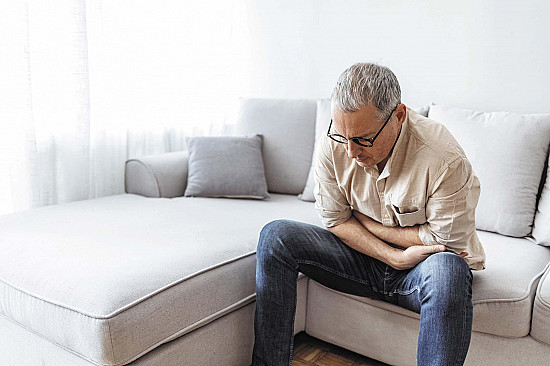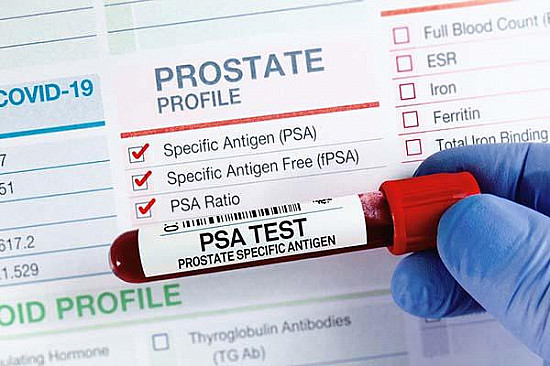Sex and prostate health
How treating an enlarged prostate may affect your sex life.
- Reviewed by Howard E. LeWine, MD, Chief Medical Editor, Harvard Health Publishing; Editorial Advisory Board Member, Harvard Health Publishing

Benign prostatic hyperplasia (BPH), also known as an enlarged prostate, affects about half of men ages 51 to 60, and the rate steadily rises with age.
As the prostate grows, it constricts the urethra, the tube that carries urine out of the body. For about half of men with BPH, this causes urination problems, such as a hesitant, interrupted, or weak urine stream; dribbling; a feeling that the bladder doesn't completely empty; and more frequent urination, especially at night.
Medication is the first-line treatment for BPH, but if drugs are not effective, surgery may be needed.
While side effects are a possibility for any medical treatment, with BPH, men are often concerned how treatments could affect their sex life. Depending on the treatment, sexual side effects can include erectile dysfunction (ED), low libido, reduced volume of ejaculation, or retrograde ejaculation (in which semen travels backward into the bladder rather than out through the penis).
"Men need to understand the risks when treating BPH to help with their treatment decision and to be better prepared in case any sexual-related problems arise," says Dr. Martin Kathrins, a urologist with Harvard-affiliated Brigham and Women's Hospital. Here's a look at how medication and surgery for BPH may affect a man's sex life.
Medication
Three types of drugs are approved to treat BPH: alpha blockers, 5-alpha-reductase inhibitors, and the ED drug tadalafil (Cialis) — a phosphodiesterase-5 (PDE5) inhibitor. Your doctor may prescribe one or several of these drugs, as they work well together. If sexual side effects do appear, speak with your doctor about changing doses or switching to another medication.
Alpha blockers. Alpha blockers help relax the prostate's grip on the urethra, allowing urine to flow more freely. The five alpha blockers used for BPH are alfuzosin (Uroxatral), doxazosin (Cardura), silodosin (Rapaflo), tamsulosin (Flomax), and terazosin.
Side effects: Many men notice reduced ejaculation volume. The main cause is retrograde ejaculation. One study found that tamsulosin reduced ejaculate volume in almost 90% of men, and about one-third experienced no ejaculation. Some men have found less of this effect from other alpha blockers. "While men may find both of these issues unsettling at first, they don't necessarily interfere with the ability to achieve an erection or orgasm," says Dr. Kathrins.
5-alpha-reductase inhibitors. The two FDA-approved drugs for BPH are dutasteride (Avodart) and finasteride (Proscar). These drugs shrink the enlarged prostate to reduce pressure on the urethra and bladder, making it easier to pass urine and reducing symptoms.
Side effects: Reported sexual side effects include low libido, ED, and reduced ejaculate volume (although less than with alpha blockers). "Yet, studies show that fewer than 10% of men reported these problems," says Dr. Kathrins. These drugs also can lower sperm count, which is a concern only for men who still want to father children.
Tadalafil (Cialis). This PDE5 inhibitor is the only drug in its class approved to treat both ED and BPH. When taken in low doses (5 milligrams daily), the drug relaxes the connection between the bladder and the urethra, which improves urine flow and helps the bladder empty.
Side effects: While tadalafil isn't linked with the sexual side effects of other BPH drugs, there is a low risk it may hinder sex drive by causing headaches, flushing, or an upset stomach.
Minimally invasive surgical optionsMany minimally invasive options are now available to treat BPH. These carry a low risk of sexual side effects, especially retrograde ejaculation and erectile dysfunction. Two popular choices are prostatic urethral lift and water vapor thermal therapy (Rezum, pronounced "resume"). During a prostatic urethral lift, the surgeon inserts a device called a UroLift through the urethra to the prostate. It pushes the obstructive tissue aside and delivers tiny implants that lift and hold the tissue in place so urine can flow easily. Rezum uses a thin hollow tube that is inserted through the penis to the prostate. Nine seconds of steam is blasted onto prostate cells, killing them and causing the enlarged tissues to gradually shrink. "These are possible options for men who have relatively smaller prostates," says urologist Dr. Martin Kathrins with Brigham and Women's Hospital. |
Surgery
Two procedures are commonly used to treat BPH: transurethral resection of the prostate (TURP) and photoselective vaporization of the prostate (PVP). Sexual side effects from these procedures may be permanent.
TURP. With TURP, a thin tube is passed through the urethra to the prostate. An electrical loop at the end of the tube scoops away prostate tissue to relieve urinary obstruction.
Side effects: More than half of men who have TURP experience retrograde ejaculation. ED also can occur, but only affects about 12% of men.
PVP. With PVP, a thin optic fiber tube is guided through the urethra to the prostate. Laser energy then vaporizes excess prostate tissue, which is excreted through the urine. Various lasers are used, but the potassium-titanyl-phosphate laser, known as GreenLight, is the most popular.
Side effects: The risk of retrograde ejaculation is lower than with TURP but still considered high. ED also can affect about the same percentage of men as with TURP, according to Dr. Kathrins.
Image: © Laurence Monneret/Getty Images
About the Author

Matthew Solan, Former Executive Editor, Harvard Men's Health Watch
About the Reviewer

Howard E. LeWine, MD, Chief Medical Editor, Harvard Health Publishing; Editorial Advisory Board Member, Harvard Health Publishing
Disclaimer:
As a service to our readers, Harvard Health Publishing provides access to our library of archived content. Please note the date of last review or update on all articles.
No content on this site, regardless of date, should ever be used as a substitute for direct medical advice from your doctor or other qualified clinician.
















